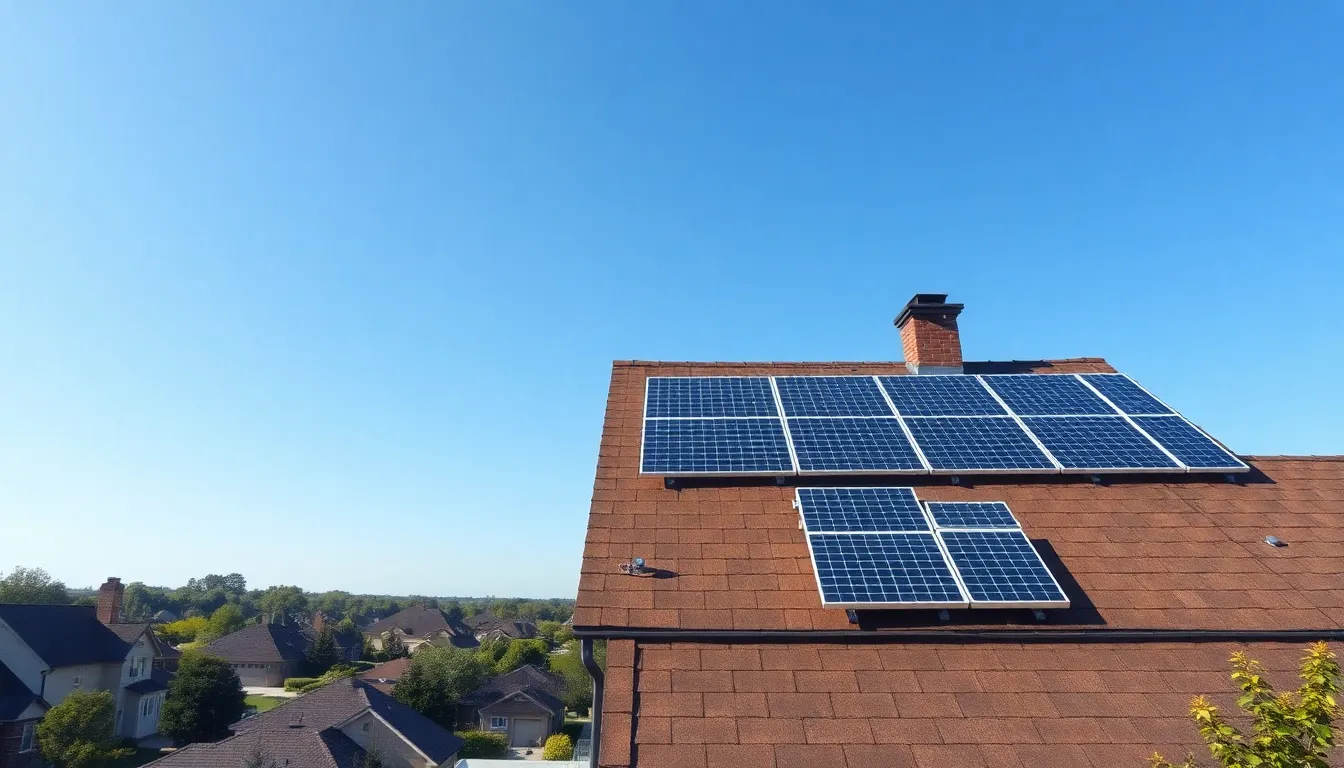Imagine harnessing the sun’s power while cutting down on those pesky energy bills. Sounds like a dream, right? Well, it’s time to wake up and smell the solar panels! These sleek, shiny wonders are transforming rooftops into mini power plants, making energy savings as easy as a sunny day.
Table of Contents
ToggleOverview of Solar Panels
Solar panels convert sunlight into electricity, making them a crucial technology in renewable energy. By harnessing solar power, homeowners can decrease energy costs while contributing to environmental sustainability.
What Are Solar Panels?
Solar panels are devices that capture sunlight and transform it into usable electricity. They consist mainly of photovoltaic cells that generate electrical energy when exposed to sunlight. These cells are often arranged in modules or panels, allowing for efficient energy collection. Homeowners and businesses use these panels primarily to reduce reliance on traditional energy sources. Installed on rooftops or ground-mounted in larger arrays, these panels provide a decentralized approach to energy generation.
Types of Solar Panels
Various types of solar panels exist, each suited for different applications. Monocrystalline panels rank highest in efficiency and take up less space, making them a popular choice for residential installations. Polycrystalline panels, while slightly less efficient, offer a more affordable option with a longer lifespan. Thin-film solar panels provide flexibility and lightweight designs, suitable for unique installations. Each type has its advantages, and selecting the right kind depends on factors like budget, space, and energy needs.
Benefits of Solar Panels

Solar panels offer substantial advantages, focusing on environmental sustainability and financial savings. By capturing solar energy, they lead to a cleaner, greener future.
Environmental Impact
Solar panels significantly reduce greenhouse gas emissions. They generate clean electricity while minimizing dependence on fossil fuels. The adoption of solar energy decreases air pollution, benefiting public health. Moreover, solar energy helps conserve water, essential for maintaining ecological balance. Many studies indicate that vast installations of solar panels can lead to a reduction in carbon footprint. Locations with a high adoption rate of solar technology contribute positively to the fight against climate change.
Cost Savings
Homeowners experience notable reductions in energy bills after installing solar panels. Savings can reach up to 30% or more, depending on location and system size. Financial incentives like tax credits and rebates further enhance affordability. Many regions offer net metering programs, allowing users to sell excess electricity back to the grid. Over time, solar panels lead to substantial return on investment. Additionally, solar systems often increase property values, making them appealing long-term investments.
Installation Process of Solar Panels
The installation process for solar panels involves several key steps. First, a thorough understanding of the site is essential.
Site Assessment
A comprehensive site assessment identifies optimal conditions for solar panel installation. Inspecting the roof’s orientation and angle ensures maximum sun exposure. Evaluating shading from nearby trees or buildings helps determine the most effective placement. A professional assessment may also include considerations for local building codes, ensuring compliance with regulations. Additionally, analyzing the structural integrity of the roof validates its capacity to support the solar system. This detailed evaluation lays the groundwork for a successful installation.
Choosing the Right Installer
Selecting a qualified installer significantly impacts the performance and longevity of solar panels. Researching local companies helps identify those with proven track records. Reviews and testimonials provide insights into previous customer experiences, revealing the installer’s reliability. Comparing certifications and industry affiliations highlights professionalism and expertise. Asking for detailed quotes allows potential customers to evaluate pricing and services. Trustworthy installers often offer warranties for both installation and equipment, ensuring peace of mind for homeowners. Making an informed choice guarantees a successful transition to solar energy.
Maintenance of Solar Panels
Maintaining solar panels ensures optimal performance and longevity. Regular attention to cleaning and monitoring can maximize energy generation.
Cleaning and Upkeep
Regular cleaning keeps solar panels efficient. Dust, dirt, and bird droppings can significantly reduce efficiency. Experts recommend biannual cleaning, especially in dusty areas or locations with heavy bird activity. Homeowners can use a soft brush or a hose for gentle cleaning, ensuring no damage occurs. Professional cleaning services offer thorough maintenance options as well. Checking and clearing debris from the panels can enhance energy generation by up to 20%, depending on environmental conditions.
Monitoring Performance
Monitoring performance is essential for ensuring solar panels operate at peak efficiency. Homeowners can use monitoring systems that track energy production in real-time. Anomalies in output often indicate potential issues, such as panel shading or failures. Regularly reviewing performance data helps identify when maintenance is necessary. Installing smart inverters enables users to receive alerts for any discrepancies in performance, maintaining consistent energy production. Keeping an eye on energy output can lead to quick intervention and prevent long-term efficiency loss.
Solar panels represent a transformative solution for energy consumption and environmental sustainability. By investing in solar technology homeowners and businesses can significantly cut energy costs while contributing to a cleaner planet. With various panel types available there’s an option for every need and budget.
The installation process and ongoing maintenance are straightforward when approached with the right information and professional help. Regular monitoring ensures optimal performance and longevity. As solar energy becomes more accessible the benefits will only grow making it a wise choice for those looking to enhance their energy independence and reduce their carbon footprint. Embracing solar energy is not just a financial decision but a commitment to a sustainable future.




